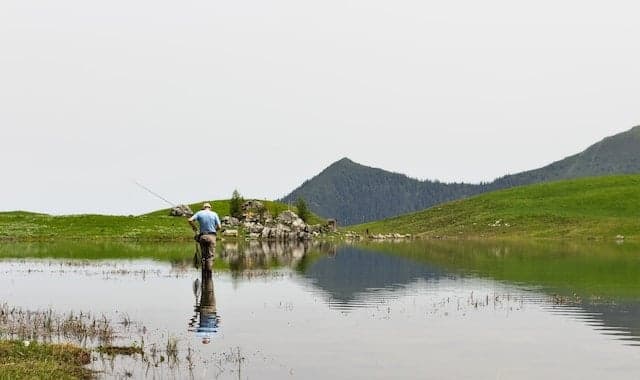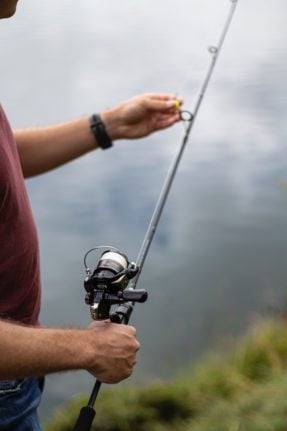Everything you need to know about fishing in Switzerland

Switzerland is home to 61,000 kilometres of rivers, many of which are perfect for fishing. But before you set off on your fishing adventure, it's important to familiarise yourself with Swiss laws and ensure you have the necessary permits.
Do I need a fishing licence in Switzerland?
If you’ve recently moved to Switzerland or picked up fishing as a hobby, remember that planning a fishing trip in Switzerland isn’t as simple as picking up your fishing line and finding a comfortable spot at your nearest riverbank: it requires a licence.
In fact, nearly all waters in the country require fishermen and women to have their fishing license on hand. Swiss rivers can be either private or public but almost always require a fishing licence, so if you’re unsure whether your local river requires a licence, we recommend you double-check with the responsible fishing authority or your local fishing association.
In the canton of Bern, for instance, most bodies of water will allow you to fish with a valid licence whereas in some other cantons all bodies of water are leased and a different set of rules applies.
How do I obtain a fishing licence?
In order to fish in rivers and streams across Switzerland you will need a valid certificate of competence in fishing (SaNa) or an equivalent foreign certificate. The SaNa certificate is a basic one to two-day training course which is offered in various locations throughout Switzerland and is required of anyone who wants to acquire a licence for a period of one month or longer.
However, it is worth noting that in many cantons the SaNa is not required for a single day or even a weekly fishing licence, while yet other cantons may have different rules altogether.
Am I allowed to fish all fish species in all seasons?
Most of the fish that people in Switzerland fish for are subject to a closed season which is intended to allow the fish to spawn stress-free and is therefore regulated by law.
As with most things in Switzerland, the closed season too is adapted by the cantons to the respective circumstances and may differ from canton to canton. However, as a rule of thumb, trout, Arctic char, blue whitefish, grayling, Alburnus arborella, and local crabs may not be caught in autumn and winter.

It is possible to fish in Switzerland - but you need a licence. Photo by Stefan Lehner on Unsplash
In trout regions, the fishing seasons usually begin in May and end in autumn. If you’re hoping to fish between the months of September and May, however, you still need to ensure you are well informed and abide by the law when it comes to fishing various species. Remember that every fish species has its own minimum size requirement and catch limit which you should never exceed.
Is it true that catch-and-release fishing is illegal in Switzerland?
Yes, catch-and-release fishing – which is the act of removing a fish during the open season that is of the minimum legal size for fishing from a body of water simply to return it back to the water – is considered inhumane and banned in Switzerland.
However, it is important to note that catching any fish out of season as well as one that is too small according to the legal size limit for fishing must be released immediately with all due care. In fact, the Swiss take their animal laws very seriously and this practice was banned at federal level under the Swiss Animal Welfare Act a few years ago.
You must likewise not go fishing with the intent of catching fish only to release them, but this doesn’t mean you can’t release any fish you catch either. You can, if you wish, release a single selected fish for ecological reasons so long as the fish is in good condition and has a good chance of survival: this is perfectly legal.
READ ALSO: Why does Switzerland have such strict animal rights laws compared to elsewhere?
Which species of fish should be returned to the water?
There are over 50 native fish species in Switzerland alongside a few non-native fish species which mostly came to Swiss waters for breeding purposes. However, around 60 percent of the fish in Switzerland are already threatened with extinction, making it crucial that fisherfolk obey Swiss fishing laws when deciding to pick up fishing in the country.
In Switzerland there are a number of fish species that are protected nationwide and must be released immediately and carefully in any case. These include the common nase as well as its subspecies, the Zingel asper, Misgurnus, sea trout, Salmo marmoratus, Gobiidae, brook lamprey, Rhodeus and the Atlantic salmon. The fishing of salmon must also be documented at all times.
Since 2020, Switzerland also bans the fishing of eel, pigo and Triotto.
READ ALSO: Switzerland's native fish 'threatened' with extinction
Am I allowed to use a barbed hook?
No, fishing with a barbed hook is generally prohibited in Switzerland, but there are exceptions. For use in lakes, cantons may allow fishing using barb hooks provided the individual can demonstrate they are competent enough to use them.
Hooked barbs are however strictly forbidden in so-called flowing waters, such as rivers and streams, at all times.
Can I fish with live bait fish?
In general, fishing with live bait fish is prohibited, but here, too, the cantons can grant exceptions so keep an eye on local regulations.
For now, we'll leave you with this fishy tongue twister every Swiss kid is made to practice at least once in their life (which translates to "Fisherman Fritz fishes fresh fish"): Fischers Fritz fischt frische Fische, Frische Fische fischt Fischers Fritz. Try repeating it quickly 10 times in a row.
Comments
See Also
Do I need a fishing licence in Switzerland?
If you’ve recently moved to Switzerland or picked up fishing as a hobby, remember that planning a fishing trip in Switzerland isn’t as simple as picking up your fishing line and finding a comfortable spot at your nearest riverbank: it requires a licence.
In fact, nearly all waters in the country require fishermen and women to have their fishing license on hand. Swiss rivers can be either private or public but almost always require a fishing licence, so if you’re unsure whether your local river requires a licence, we recommend you double-check with the responsible fishing authority or your local fishing association.
In the canton of Bern, for instance, most bodies of water will allow you to fish with a valid licence whereas in some other cantons all bodies of water are leased and a different set of rules applies.
How do I obtain a fishing licence?
In order to fish in rivers and streams across Switzerland you will need a valid certificate of competence in fishing (SaNa) or an equivalent foreign certificate. The SaNa certificate is a basic one to two-day training course which is offered in various locations throughout Switzerland and is required of anyone who wants to acquire a licence for a period of one month or longer.
However, it is worth noting that in many cantons the SaNa is not required for a single day or even a weekly fishing licence, while yet other cantons may have different rules altogether.
Am I allowed to fish all fish species in all seasons?
Most of the fish that people in Switzerland fish for are subject to a closed season which is intended to allow the fish to spawn stress-free and is therefore regulated by law.
As with most things in Switzerland, the closed season too is adapted by the cantons to the respective circumstances and may differ from canton to canton. However, as a rule of thumb, trout, Arctic char, blue whitefish, grayling, Alburnus arborella, and local crabs may not be caught in autumn and winter.

In trout regions, the fishing seasons usually begin in May and end in autumn. If you’re hoping to fish between the months of September and May, however, you still need to ensure you are well informed and abide by the law when it comes to fishing various species. Remember that every fish species has its own minimum size requirement and catch limit which you should never exceed.
Is it true that catch-and-release fishing is illegal in Switzerland?
Yes, catch-and-release fishing – which is the act of removing a fish during the open season that is of the minimum legal size for fishing from a body of water simply to return it back to the water – is considered inhumane and banned in Switzerland.
However, it is important to note that catching any fish out of season as well as one that is too small according to the legal size limit for fishing must be released immediately with all due care. In fact, the Swiss take their animal laws very seriously and this practice was banned at federal level under the Swiss Animal Welfare Act a few years ago.
You must likewise not go fishing with the intent of catching fish only to release them, but this doesn’t mean you can’t release any fish you catch either. You can, if you wish, release a single selected fish for ecological reasons so long as the fish is in good condition and has a good chance of survival: this is perfectly legal.
READ ALSO: Why does Switzerland have such strict animal rights laws compared to elsewhere?
Which species of fish should be returned to the water?
There are over 50 native fish species in Switzerland alongside a few non-native fish species which mostly came to Swiss waters for breeding purposes. However, around 60 percent of the fish in Switzerland are already threatened with extinction, making it crucial that fisherfolk obey Swiss fishing laws when deciding to pick up fishing in the country.
In Switzerland there are a number of fish species that are protected nationwide and must be released immediately and carefully in any case. These include the common nase as well as its subspecies, the Zingel asper, Misgurnus, sea trout, Salmo marmoratus, Gobiidae, brook lamprey, Rhodeus and the Atlantic salmon. The fishing of salmon must also be documented at all times.
Since 2020, Switzerland also bans the fishing of eel, pigo and Triotto.
READ ALSO: Switzerland's native fish 'threatened' with extinction
Am I allowed to use a barbed hook?
No, fishing with a barbed hook is generally prohibited in Switzerland, but there are exceptions. For use in lakes, cantons may allow fishing using barb hooks provided the individual can demonstrate they are competent enough to use them.
Hooked barbs are however strictly forbidden in so-called flowing waters, such as rivers and streams, at all times.
Can I fish with live bait fish?
In general, fishing with live bait fish is prohibited, but here, too, the cantons can grant exceptions so keep an eye on local regulations.
For now, we'll leave you with this fishy tongue twister every Swiss kid is made to practice at least once in their life (which translates to "Fisherman Fritz fishes fresh fish"): Fischers Fritz fischt frische Fische, Frische Fische fischt Fischers Fritz. Try repeating it quickly 10 times in a row.
Join the conversation in our comments section below. Share your own views and experience and if you have a question or suggestion for our journalists then email us at [email protected].
Please keep comments civil, constructive and on topic – and make sure to read our terms of use before getting involved.
Please log in here to leave a comment.